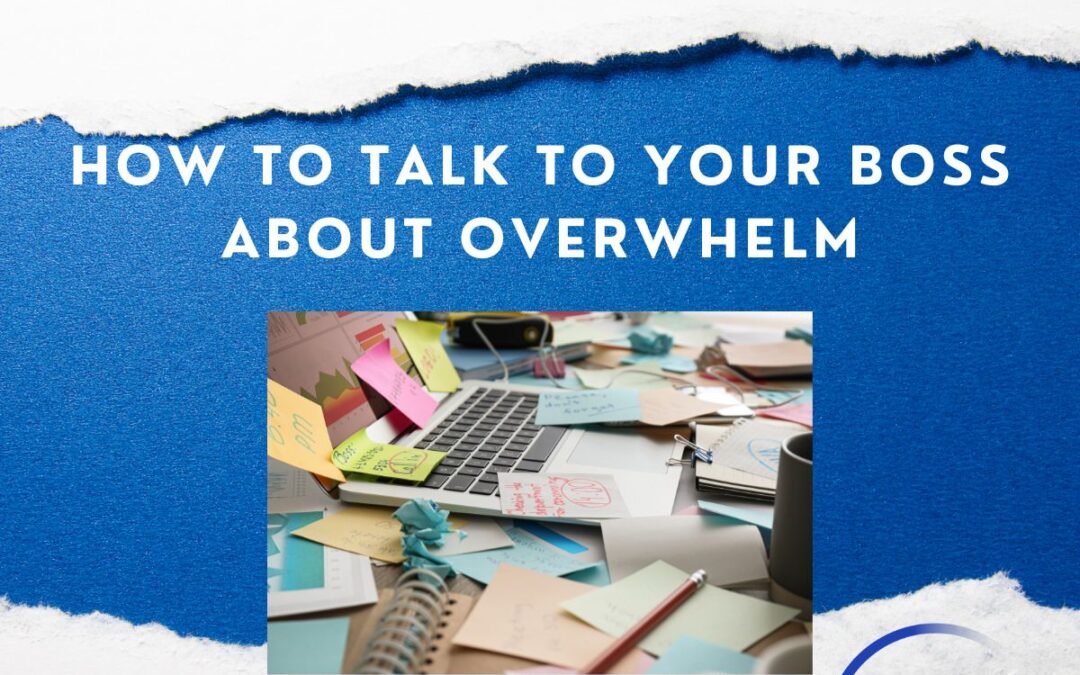Who out there is feeling overwhelmed at work? I get it, we have all been there at one time or another. But my question to you is, have you taken the first steps to talk to your manager about it? Or have you just dug in further to try to keep up with the work, only to have more piled on your desk? Well, I say it’s time to talk about it!
Embracing the Courage to Communicate
Starting a conversation about feeling overwhelmed with your boss can be as daunting as the workload that prompted it. However, shifting this challenge into an opportunity for support and self-care can lead to huge workplace improvements. I want to explore some unique strategies and perspectives to be able to effectively communicate your overwhelming experiences, ensuring that a talk with your boss is both productive and transformative.
Begin by Identifying what Triggered by Overload
Start by understanding that overwhelm isn’t just a block—it’s a flashing red sign signaling the need for change or innovation within your workflow or team dynamics. Before approaching your boss, take a moment to analyze how your feelings of overwhelm could help the team toward improvements. Are there ineffective processes that could be streamlined? Is there technology that could automate mundane tasks? This approach shifts the conversation from a personal struggle to an opportunity for team improvement.
The Art of Vulnerable Disclosure
Okay, so it is now time to talk about this with your manager! Approach the conversation with what I like to call strategic vulnerability. This means being open about your feelings while framing them within the context of your commitment to the company’s goals and your professional growth. Discuss specific instances where overwhelm impedes your ability to deliver your best work but balance it with your achievements and times you’ve successfully managed high-pressure situations. This shows that while you’re confronting challenges, you’re also proactive and resilient. Talk about it in terms of what is best for the team, and others that might be feeling the same thing. This will go farther than if you are whining about it and positioning yourself as a victim.
The Mutual Benefit Angle
When discussing overwhelm, emphasize how alleviating these pressures can benefit both you and the organization. For instance, redistributing your workload can lead to more thorough work, create a more supportive team atmosphere, and reduce burnout, which can increase overall productivity and reduce turnover. Make it clear that by supporting your need to manage overwhelm, your boss is essentially investing in the company’s human capital and retention.
Propose Solutions, Not Just Problems
Be prepared with what you would like to see change! This is very important. Instead of presenting a list of complaints, offer practical, actionable solutions. Suggest specific adjustments such as task delegation, project prioritization, or even the introduction of a pilot phase for new work strategies that might reduce overload. Show that you’ve thought beyond the problem and are ready to be part of the solution.
Follow-Up
Suggest setting up regular check-ins to discuss the progress of the implemented changes. This not only helps keep the lines of communication open but also sets an example of continuous improvement and adjustment, which is essential in most business environments. It demonstrates your commitment to not only managing your workload but optimizing it for the long-term benefit of your team and ultimately the organization..
Talking to leaders about feeling overwhelmed is more than just your airing grievances, t’s about paving the way for personal and team growth. By using these strategies, you can help transform a difficult conversation into a constructive dialogue, creating an environment where challenges are met with proactive solutions and mutual benefits.
Have you ever had a hard conversation with your manager about overwhelming work commitments or workload? If so, how did you approach it? Is there anything else you would add to this article? Please share, like, or find me on social media. I’d love to hear your thoughts on this subject and keep the conversation going!
#InnovateWorkCulture #StrategicVulnerability #SolutionsFocused

